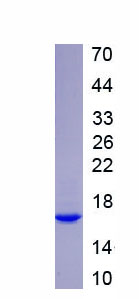Recombinant Carbonic Anhydrase VI (CA6)
CA-VI; CAVI; GUSTIN; Carbonate dehydratase VI; Salivary carbonic anhydrase; Secreted carbonic anhydrase
- Product No.RPD073Mu02
- Organism SpeciesMus musculus (Mouse) Same name, Different species.
- SourceProkaryotic expression
- HostE.coli
- Endotoxin Level<1.0EU per 1µg (determined by the LAL method)
- Subcellular LocationSecreted
- Predicted Molecular Mass15.3kDa
- Accurate Molecular Mass17kDa(Analysis of differences refer to the manual)
- Residues & TagsThr194~Phe313 (Accession # P18761) with N-terminal His Tag
- Buffer FormulationPBS, pH7.4, containing 0.01% SKL, 5% Trehalose.
- Traits Freeze-dried powder
- Purity> 97%
- Isoelectric Point9.58
-
Applications
Positive Control; Immunogen; SDS-PAGE; WB.
If bio-activity of the protein is needed, please check active protein. - DownloadInstruction Manual
- UOM 10µg50µg 200µg 1mg 5mg
- FOB
US$ 214
US$ 536
US$ 1072
US$ 3216
US$ 8040
For more details, please contact local distributors!
SEQUENCE

USAGE
Reconstitute in 10mM PBS (pH7.4) to a concentration of 0.1-1.0 mg/mL. Do not vortex.
STORAGE
Avoid repeated freeze/thaw cycles. Store at 2-8°C for one month. Aliquot and store at -80°C for 12 months.
STABILITY
The thermal stability is described by the loss rate. The loss rate was determined by accelerated thermal degradation test, that is, incubate the protein at 37°C for 48h, and no obvious degradation and precipitation were observed. The loss rate is less than 5% within the expiration date under appropriate storage condition.
GIVEAWAYS
INCREMENT SERVICES
-
 Endotoxin Removal Kit
Endotoxin Removal Kit
-
 BCA Protein Quantification Kit
BCA Protein Quantification Kit
-
 Protein Labeling Customized Service
Protein Labeling Customized Service
-
 Molecular Mass Marker for Protein
Molecular Mass Marker for Protein
-
 Recombinant Protein Customized Service
Recombinant Protein Customized Service
-
 Monoclonal Antibody Customized Service
Monoclonal Antibody Customized Service
-
 Polyclonal Antibody Customized Service
Polyclonal Antibody Customized Service
-
 Protein Activity Test Experiment Service
Protein Activity Test Experiment Service
-
 Immunoprecipitation (IP) Experiment Service
Immunoprecipitation (IP) Experiment Service
-
 Buffer
Buffer
-
 Endotoxin Removal Kit II
Endotoxin Removal Kit II
-
 Real Time PCR Experimental Service
Real Time PCR Experimental Service
-
 Spike RBD Protein (S-RBD)
Spike RBD Protein (S-RBD)
-
 Protein G
Protein G
-
 Protein A
Protein A
| Magazine | Citations |
| Metabolomics | Salivary markers of taste sensitivity to oleic acid: a combined proteomics and metabolomics approach Springer: Source |
| American Journal of Immunology | SALIVARY CARBONIC ANHYDRASE VI, ZINC SULFATE TASTE ACUITY AND FREQUENCY OF ILLNESS: A PILOT STUDY Com:Source |
| Physiol Behav. | Associations between food consumption patterns and saliva composition: Specificities of eating difficulties children. pubmed:28185876 |
| Chemical Senses | Differences in the density of fungiform papillae and composition of saliva in patients with taste disorders compared to healthy controls pubmed:28981826 |
| Caries research | Children with a Higher Activity of Carbonic Anhydrase VI in Saliva Are More Likely to Develop Dental Caries. pubmed:28633135 |
| Scientific Reports | Obese Subjects With Specific Gustatory Papillae Microbiota and Salivary Cues Display an Impairment to Sense Lipids Pubmed:29713004 |
| Appetite | Acceptance of added fat to first complementary feeding purees: An exploration of fat type, feeding history and saliva composition Pubmed: 30172680 |
| International journal of molecular sciences | Activity of Carbonic Anhydrase VI is Higher in Dental Biofilm of Children with Caries Pubmed: 31151296 |
| Acta Odontol Scand | Polymorphism in the CAVI gene, salivary properties and dental caries Pubmed: 32013665 |
| Catalog No. | Related products for research use of Mus musculus (Mouse) Organism species | Applications (RESEARCH USE ONLY!) |
| RPD073Mu01 | Recombinant Carbonic Anhydrase VI (CA6) | Positive Control; Immunogen; SDS-PAGE; WB. |
| RPD073Mu02 | Recombinant Carbonic Anhydrase VI (CA6) | Positive Control; Immunogen; SDS-PAGE; WB. |
| PAD073Mu01 | Polyclonal Antibody to Carbonic Anhydrase VI (CA6) | WB; IHC; ICC; IP. |
| PAD073Mu02 | Polyclonal Antibody to Carbonic Anhydrase VI (CA6) | WB; IHC; ICC; IP. |
| LAD073Mu71 | Biotin-Linked Polyclonal Antibody to Carbonic Anhydrase VI (CA6) | WB; IHC; ICC. |
| SED073Mu | ELISA Kit for Carbonic Anhydrase VI (CA6) | Enzyme-linked immunosorbent assay for Antigen Detection. |







